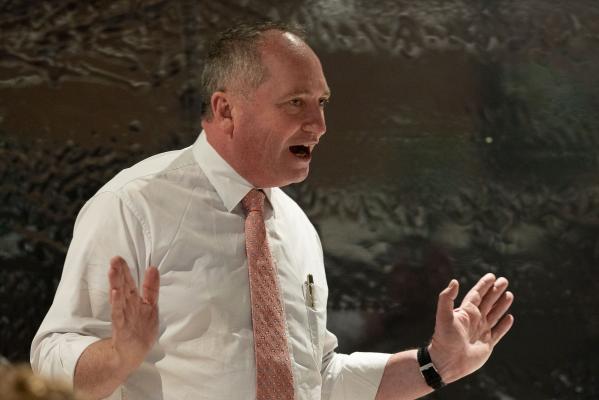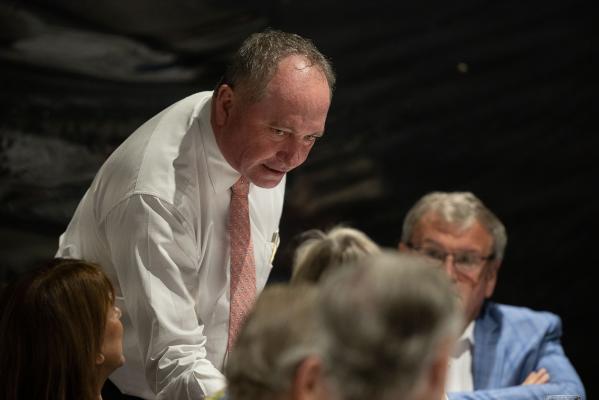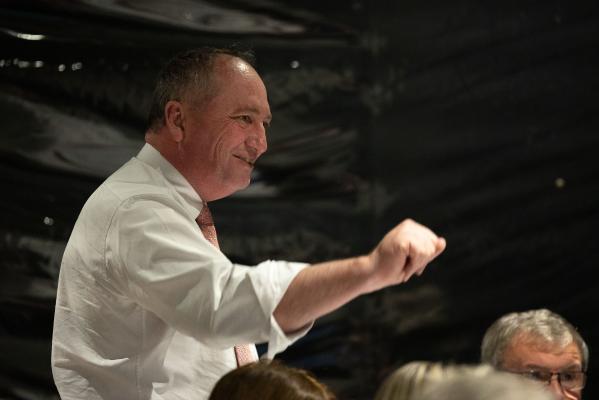In town last week to open a road upgrade and press the flesh at an LNP fundraiser, Deputy Prime Minister Barnaby Joyce made time to drop by Noosa Today for a conference with senior management, and to sit in the Hotseat for PHIL JARRATT.
You seem to be spending a lot of time in Queensland lately. Are you thinking about coming back from the dark side?
The top of my electorate [New England] finishes about 30 kilometres south of Warwick, and people up there are on both sides of the border all the time, so in a fashion I never completely left Queensland. Parts of the electorate keep on Queensland time in the summer, and people play in the Queensland country rugby league comp. And of course, I was a senator for Queensland from 2005 to 2013. Queensland gave me my start in politics and I’ll never forget that.
You’ve crossed the floor in parliament often enough to be branded a “politician of conviction”, so what’s your conviction on the Covid response, rather than your political position?
What we have to do is get as many people vaccinated as possible, but it has to be their choice. We can’t twist arms, people have to decide they want to do it. As soon as that happens we can transition back to normal society, but we have to be honest with people that they will still get sick and some will die. That’s my conviction, that we have to be truthful with people, give them the full facts and allow them to make informed decisions. There are several reasons to get vaccinated, the first being that if you don’t you might get crook and you might die. The second is that we have to get the economy going before people go out the back door. The third reason is that if you don’t get vaccinated, your decision is affecting other people as well as you. There’s a knock-on effect. One thing I’m certain of is that we can’t go on like this – locking down, opening up, closing borders, opening borders – it can’t work. We have to reach a point where we have vaccine for everyone who wants it, and if you don’t want it, we’re opening up anyway. And it’s on your shoulders.
But hang on, you’re the bloke who threatened to euthanase Johnny Depp’s dogs! You know how to be tough. We’re at war with Covid, so why can’t the government take the hard decision and mandate vaccination for all?
Well, in the case you mention, they were dogs, and dogs aren’t people. And Depp was flouting the law of the land and treating Australians like we were a joke.
What about when you have people in three states demonstrating in violation of Covid restrictions because they think Covid’s a joke?
When they flout the laws we take action. We saw it just last week when that lady [British far-right commentator Katie Hopkins] flouted the Covid laws and she was on the next plane back to London. When people break the law, they can pack their bongos and get out of here. When people express their right to freedom of choice it’s a different matter. But it has to be explained to them that this is fine when it only affects them, not everyone else. It’s like going crazy in a car on your own paddock. You might roll it and kill yourself, but you’re only hurting yourself. Do the same thing on a public road and it’s a different matter.
Okay, still talking to the conviction politician, what’s your conviction on climate change?
Well, I’m from the country where we had to pay the price for the Kyoto Protocol. People in urban areas didn’t have to do that. That’s why people like me are so cautious about signing agreements. I liken it to picking up a menu in a restaurant and there’s a question mark over what you can eat and a question mark over what you’ll have to pay. You’d be crazy if you ate there, but if someone told you that you had to eat there, what happens if they bring you out a plate of stewed rat and it costs $500!
My frustration when people tell me we have to sign up for 2050, is that I don’t know what I’m signing up for. Tell me what it is and tell me who’s going to pay for it, because we know who paid for Kyoto. If I know all that, I can make an informed decision, but the argument is that the price of not signing is far greater than the price of signing. Well, they have to prove that to me. My job as a National is not to sign anything until I can tell people exactly what I’ve signed on for.
Noosa’s obviously not the only place in Australia with an affordable housing crisis, but it’s starting to have an impact on our tourism services. Is there a solution?
There are different parts to the problem and yes, there are some solutions in providing public housing. Looking after the homeless is a subject very dear to my heart, and my focus is on the ones you don’t see, the couch-surfers or people living in cars, rather than the small proportion who are literally on the street. Government, predominantly at state level, just has to build houses. You have to give people dignity. At another level, you need to have a council that is capable of pushing through the development applications so that low-cost housing can be built. It’s not going to be waterfront in Noosa, but there are plenty of places in the back of Tewantin, for example, where housing could and should be built. There’s no silver bullet on affordable housing. It’s a problem that has always been with us and you have to manage it.
As you know, we live in a no-growth bubble in Noosa, while the rest of South East Queensland is growing on steroids. How long can we hold the line with our zoning-based population cap?
Brisbane is going to turn into a city of five million people called South East Queensland. It will start at Byron Bay and go north to Noosa and west to Toowoomba. The only green belts will be the national parks. Now we’ve seen the chaos of Sydney and Melbourne, so we have to pre-plan this one with adequate roads before the houses get built. And we also have to get serious about decentralisation. I’m not talking about moving from Ipswich to Noosa. I’m talking about Brisbane to Roma, or Emerald or Rockhampton or Longreach. Government can take the lead in that and private enterprise will follow.
In Noosa the hospitality industry is crying out for workers and further afield there are no fruit pickers. How can we replace the backpacker workforce?
Australians will work, but like most diligent people, they start at the bottom and move up. If you work in an abattoir, for a short while you might pack offal, but very quickly you’ll get into boning and then into management. There are jobs that Australians just don’t want to do and one of them is cleaning rooms in hotels and motels. Another one is picking fruit.
I picked fruit when I was a kid. Did you?
Yes, I did, and my daughter has too and she’s really good at it. (Laughs). I did more farm labouring, but I hear what you’re saying. There just aren’t enough of them who will do it. We have to bring people in from other countries to do that work, and we have to offer them a path, through hard work, to become Australian citizens. And it’s been proven that they become good citizens and they add to our culture. The Nats are pushing for an aid visa to get people here for places like Noosa.
Your side of politics often gets tagged as develop or perish, but Joh Bjelke-Petersen, the godfather of the white shoe brigade, was actually a friend of the early Noosa conservationists and on a couple of occasions pushed to keep it green. Do you think preserving the environment should be above politics?
I think it should, once you’ve defined what’s unique and what should be protected. The rainforests and foreshores of Noosa are unique, but if you tell me that you can’t touch a forest that’s not unique somewhere out west, I’ll say come up in a plane with me and see these same trees as far as the eye can see. You have to keep a cogent balance in place, and protect what really needs to be protected. And that balance applies to the built environment too. If I want to walk along the beach in the shade of tall buildings, I’ll go down the road to the Gold Coast. In Noosa I don’t want shadows on the beach, and Noosa will never be like that.









